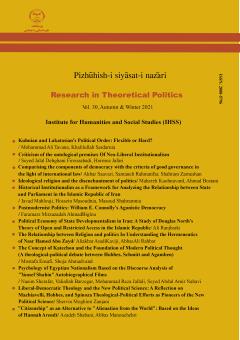Psychology of Egyptian Nationalism Based on the Discourse Analysis of "Yousef Shahin" Autobiographical Films
Subject Areas : پژوهش سیاست نظریNaeem Sherafat 1 , Valiollah Barzegar Klishomi 2 , Mohammad Reza Jalali 3 , Seyed Abdul Amir Nabavi 4
1 - Ph.D Student Department of History and Civilization of Islamic Nations, Imam Khomeini International University, Iran.
2 - Assistant Professor, Department of History and Civilization of Islamic Nations, Imam Khomeini International University, Iran.
3 - Assistant Professor, Department of Psychology, Imam Khomeini International University, Iran.
4 - Associate Professor, Department of Regional Studies, University of Tehran, Iran
Keywords: Nassirist Nationalism, Nationalism Discourse, Arab Nationalist Man, Lacan Psychology, Psychology of Nationalism.,
Abstract :
This article, by accepting the hypothesis of confusion of the soul and mind of the Arab intellect in the nationalist revolutions of the Arab countries, seeks to analyze the behaviors and actions of the Arab nationalist man in the face of others in the revolutionary discourse of Nasserism. Arab nationalism in the four autobiographical films of Egyptian director Youssef Shahin Based on the method of discourse analysis and in the theoretical framework of Jacques Lacan's subject psychology. The young revolutionary intellectual of Egypt in the 1950s and 1960s is attracted to the signifiers of the discourse of Nassirist nationalism due to ideological and identical cleavages resulting from centuries of domination by transnational and proxy systems; A discourse that was initially thought of as an infinite matter (reality) and the manifestation of the utopia and the place of realization of the repressed desires of the Arab man (subject), but over time, the contradictions between the slogan and practice in the mentioned discourse became known to all and as a Discourse and the imposed (symbolic dimension) were forcibly accepted by the emerging dictatorship of Arab nationalism. The young revolutionary intellectual who was once fascinated by this discourse, after seeing the defeat and humiliation of Arab nationalism in the war with Israel and the financial and moral scandal of its commanders, suffers a lot of pain and longing (jouissance). But, because of their fascination with this discourse, hides them and after a while, like his father (Nasserist discourse), he experiences a similar tyranny. The main question of this article is why the behavior of the Egyptian revolutionary intellectuals changed from freedom-seeking to tyranny?
